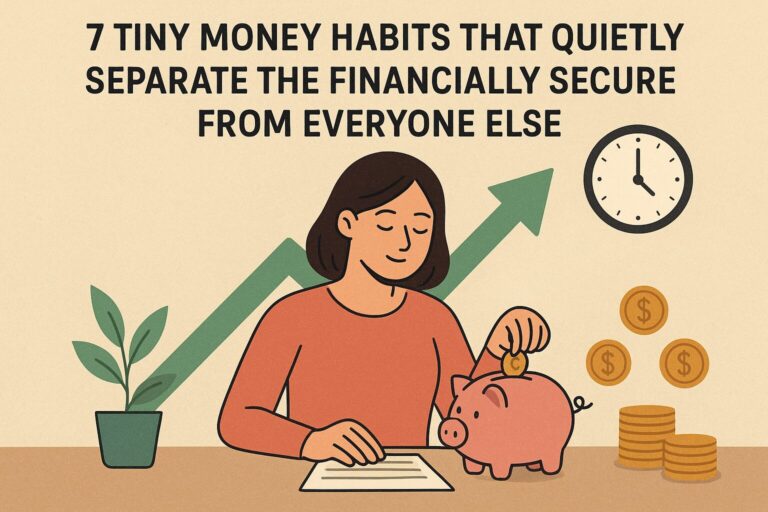Financial security is often portrayed as a dramatic event—an IPO windfall, a viral startup sale, or a lucky real estate purchase that “changed everything.” But if you look closer at most people who actually stay financially secure, you find a different story. It’s not one big leap. It’s dozens of small, boring, almost invisible habits repeated for years until they stop being conscious choices at all.
They’re not the habits that get books written about them. They don’t make for great TikToks or cocktail party stories. In fact, they tend to sound anticlimactic—until you run the math. The difference these habits make is more like a slow geological change than a lightning strike. But over time, the cliff face moves.
Below are seven of these habits, along with examples, research insights, and a few reminders from history that human money behavior hasn’t changed all that much in the past few centuries.
1. They Automate the Unsexy Stuff
If there’s a chance to remove a decision from daily life, financially secure people tend to take it. This is especially true for anything that protects them from their own short-term impulses.
Direct deposit into savings, automatic retirement contributions, and bill autopay are obvious examples. But there’s also a subtler form: automating overpayments on long-term obligations.
Consider someone with a $300,000 mortgage at 5%. Adding just one extra principal payment per year can cut four years off the loan term. The person who sets that up once, forgets about it, and never has to “remember to save” gains the same benefit as someone who actively chooses to overpay every year—and we both know who’s more likely to stick to it.
Case in point: In the early 2000s, Canadian banks began offering “accelerated bi-weekly” mortgage payments, which quietly result in 26 half-payments per year instead of 24. That small difference shaved years off loans for thousands of households who never sat down to run the math.
| Task | Typical Approach | Financially Secure Approach | Long-term Effect |
| Retirement contributions | Contribute when reminded | Auto-deduct % of salary every payday | Wealth accumulation without constant decision-making |
| Bill payments | Manual payment before due date | Autopay via bank/provider | No late fees, better credit score |
| Mortgage | Pay minimum monthly | Auto-add extra principal payment quarterly | Years shaved off loan term |
| Savings | Transfer when “extra” money exists | Fixed transfer right after payday | Predictable growth |
Automation doesn’t just save time. It eliminates the moments when willpower can be overridden by a “just this once” decision.
2. They Treat “Found Money” Like It Never Existed
The financially secure are masters of reframing unexpected income.
If a $2,500 tax refund lands, most people mentally mark it as “extra” and feel free to spend it. The financially secure often treat it as an invisible windfall—shuffling it to investments, debt payoff, or emergency savings before it has a chance to linger in the checking account.
During WWII, the U.S. introduced payroll withholding for taxes. Households who had been used to paying a lump sum in April suddenly got “less” in their monthly pay but didn’t notice as much because it was never there to begin with. Behavioral economists call this the mental accounting effect—what you never see, you never miss.
A simple formula some households use:
- Spend up to 10% of a windfall guilt-free (the dinner, the shoes, the fun).
- Save or invest the other 90% immediately.
Over a decade, that habit can turn irregular money—bonuses, side income, refunds—into a secondary engine for wealth.
3. They Keep “Quiet” Budgets
When most people imagine budgeting, they picture the obsessive, line-by-line kind that requires you to know exactly how much you spent on coffee last month. Financially secure people often do the opposite: they keep what I call a quiet budget.
A budget is broad and adaptable. It focuses on three or four spending categories, leaves wiggle room for the unexpected, and doesn’t require constant accounting. It’s sustainable because it’s not exhausting.
| Method | Strengths | Weaknesses | Long-term Viability |
| Detailed line-item budget | High accuracy | Time-consuming, easy to abandon | Low |
| Quiet budget (broad categories) | Sustainable, adaptable | Less precise tracking | High |
| No budget | No time cost | High overspending risk | Low |
Quiet budgets thrive because they focus on big levers—housing, transportation, savings rate—where the largest impact lies.
4. They Maintain a “Boring” Emergency Fund
If you’ve ever had to replace a transmission the same month as a medical bill, you understand why the emergency fund exists. Financially secure people treat this money as sacred and untouchable. It’s not there to chase market gains; it’s there to buy time and avoid panic.
Psychologically, an emergency fund changes decision-making. When a layoff or unexpected bill happens, those without a buffer have to react, often by taking the first job offer or the most expensive short-term fix. Those with a buffer can choose, waiting for a better job or negotiating calmly.
During the Panic of 1907, banks without reserves had to shut their doors or take emergency loans at punishing rates. Banks that had built larger cash reserves weathered the crisis without losing depositor trust. The principle is the same at the household level.
Common setup among the secure:
- Minimum: 3 months essential expenses in cash or high-yield savings.
- Preferred: 6–12 months, especially for those with irregular income.
It’s “boring” because it just sits there. Which is exactly the point.
5. They Avoid Lifestyle Creep—On Purpose
Lifestyle creep isn’t about buying the occasional upgrade; it’s about letting your spending rise automatically with every bump in income until you’re no better off financially than before.
Secure households decide before a raise or bonus what portion will go toward lifestyle and what will go toward future security. Often, it’s a fixed ratio—say, 40% lifestyle, 60% savings/investment.
| Raise Amount | Typical Spending Habit | Financially Secure Habit | Outcome After 10 Years* |
| $5,000/year | Spend $5,000/year more | Spend $2,000/year more, save $3,000/year | +$45k invested (assuming 5% annual growth) |
| $10,000/year | Upgrade lifestyle fully | Split: 40% lifestyle, 60% invest | +$90k invested |
| *Excluding employer matches or compounding interest on earlier savings |
Case in point: The “Millionaire Next Door” research famously showed that many U.S. millionaires lived in homes worth far less than they could “afford” on paper. They redirected that difference into investments instead of bigger mortgages, and compounding did the rest.
6. They Make Debt Decisions Before They’re Urgent
When a major expense hits without warning, most people either take on expensive debt or delay the fix. Financially secure people tend to anticipate these events years in advance. They know cars age, roofs leak, and appliances fail—not as surprises, but as eventualities.
This anticipation means setting up sinking funds (small, regular contributions to cover big, irregular expenses) and having credit options lined up before they’re needed. That last point is key—access to a low-interest credit line before an emergency is far cheaper than scrambling for it mid-crisis.
Modern example: In 2021, a New England family replaced their 20-year-old furnace for $8,000 without touching savings. They’d been contributing $150/month to a “house upkeep” account since the day they bought the home. When the furnace finally failed, the money was sitting there, no credit card debt, no panic.
7. They Know Their “Enough” Number
Perhaps the rarest habit is clarity about when more money will no longer improve life meaningfully. This isn’t about rejecting ambition; it’s about having a threshold where money shifts from being a life necessity to a tool for choice and freedom.
After selling his textile business in the 1800s, Francis Cabot Lowell invested enough to live comfortably for life, then spent the rest of his energy on industrial and civic projects. He had his “enough” number and stopped chasing purely for more.
Knowing this number changes everything from career decisions to risk tolerance. It allows you to decline certain jobs, avoid burnout, and focus on pursuits that may not be the highest-paying but add value in other ways.
Why These Habits Work
What ties these habits together is their cumulative, low-friction nature. They don’t require daily discipline or constant motivation. They’re structured so that the “right” choice happens by default.
In an age of endless financial advice, this is worth remembering: financially secure people are rarely those making the perfect move at every turn. They’re the ones making the good enough move consistently for decades.



